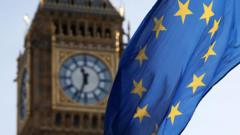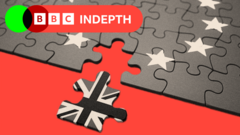Leaders will negotiate key agreements on trade barriers, defense pacts, and youth mobility schemes, amidst ongoing complexities and public sentiment.
Bilateral Breakthrough: UK and EU Meet for Landmark Post-Brexit Summit

Bilateral Breakthrough: UK and EU Meet for Landmark Post-Brexit Summit
As tensions ease, the UK and EU gear up for their first summit since Brexit, aiming for trade resets and cooperative security measures.
In a significant diplomatic gesture, the UK and the EU convene for their first bilateral summit since Brexit in London on Monday, marking a symbolic moment in their post-Brexit relationship. Both sides are acknowledging the need to overcome prior hostilities, largely replaced by concerns over global political dynamics with the likes of Russia and China redefining the landscape.
In light of the ongoing war in Ukraine and the necessity for European security, officials and analysts express cautious optimism about the chances for a constructive dialogue. "Don't expect miracles, but know – everyone wants this to work," noted one official ahead of the summit. The necessity of collaboration is palpable, especially given the fallout from both the Trump era and the pressures of voter insecurity.
In the lead-up to the summit, France has been especially vocal, highlighting the ongoing contentious issues such as fishing rights and EU defense contracts. Notably, Britain extended an invitation for a state visit to French President Emmanuel Macron, potentially signaling an effort to strengthen bilateral ties. "It'll be interesting to see if they can agree on common language for a summit agreement," stated Georgina Wright, a European policy expert.
The summit promises three key announcements aimed at geopolitical collaboration. Firstly, a joint declaration on foreign policy is expected, encompassing shared priorities such as support for Ukraine and addressing humanitarian crises. Secondly, a pact regarding security and defense cooperation will be introduced, while thirdly, a framework aimed at alleviating trade barriers post-Brexit will be discussed.
Despite hopes for improved economic conditions, there are limitations. The current Labour government remains committed to not rejoining the EU's customs union, which suggests that the measures agreed upon may merely mark a softening stance rather than a revolutionary shift. While there are indications that the UK public favors enhanced trade with the EU, the rise of Eurosceptic parties poses a challenge to Labour's strategic positioning.
Notably, the negotiations include a plan for a "mobility" section that would see the EU recognize UK professional qualifications, while also easing visa restrictions for UK performers traveling abroad. However, the EU also seeks to establish a youth mobility scheme for young EU citizens in the UK, an effort complicated by the UK’s focus on reducing immigration.
Discussions around a new fishing agreement will also be crucial, as the current arrangement is set to lapse next year. The EU's firm stance on securing long-term fishing rights signifies ongoing tensions that must be navigated carefully.
The summit will also evaluate a defense and security framework, which, while non-binding, hopes to establish closer cooperation on issues like Russian sanctions and military support for Ukraine. Yet, the UK’s access to EU defense contracts remains a contentious topic, particularly with France advocating for limitations on non-EU bids, raising concerns about whether the UK will be given a fair play in upcoming defense engagements.
As German Chancellor Friedrich Merz advocates for improved UK relations, the summit could be pivotal for establishing a renewed and pragmatic relationship between the UK and EU. However, the road ahead remains complex, fraught with a multitude of competing interests that will require significant negotiation and compromise from both sides.
In light of the ongoing war in Ukraine and the necessity for European security, officials and analysts express cautious optimism about the chances for a constructive dialogue. "Don't expect miracles, but know – everyone wants this to work," noted one official ahead of the summit. The necessity of collaboration is palpable, especially given the fallout from both the Trump era and the pressures of voter insecurity.
In the lead-up to the summit, France has been especially vocal, highlighting the ongoing contentious issues such as fishing rights and EU defense contracts. Notably, Britain extended an invitation for a state visit to French President Emmanuel Macron, potentially signaling an effort to strengthen bilateral ties. "It'll be interesting to see if they can agree on common language for a summit agreement," stated Georgina Wright, a European policy expert.
The summit promises three key announcements aimed at geopolitical collaboration. Firstly, a joint declaration on foreign policy is expected, encompassing shared priorities such as support for Ukraine and addressing humanitarian crises. Secondly, a pact regarding security and defense cooperation will be introduced, while thirdly, a framework aimed at alleviating trade barriers post-Brexit will be discussed.
Despite hopes for improved economic conditions, there are limitations. The current Labour government remains committed to not rejoining the EU's customs union, which suggests that the measures agreed upon may merely mark a softening stance rather than a revolutionary shift. While there are indications that the UK public favors enhanced trade with the EU, the rise of Eurosceptic parties poses a challenge to Labour's strategic positioning.
Notably, the negotiations include a plan for a "mobility" section that would see the EU recognize UK professional qualifications, while also easing visa restrictions for UK performers traveling abroad. However, the EU also seeks to establish a youth mobility scheme for young EU citizens in the UK, an effort complicated by the UK’s focus on reducing immigration.
Discussions around a new fishing agreement will also be crucial, as the current arrangement is set to lapse next year. The EU's firm stance on securing long-term fishing rights signifies ongoing tensions that must be navigated carefully.
The summit will also evaluate a defense and security framework, which, while non-binding, hopes to establish closer cooperation on issues like Russian sanctions and military support for Ukraine. Yet, the UK’s access to EU defense contracts remains a contentious topic, particularly with France advocating for limitations on non-EU bids, raising concerns about whether the UK will be given a fair play in upcoming defense engagements.
As German Chancellor Friedrich Merz advocates for improved UK relations, the summit could be pivotal for establishing a renewed and pragmatic relationship between the UK and EU. However, the road ahead remains complex, fraught with a multitude of competing interests that will require significant negotiation and compromise from both sides.


















